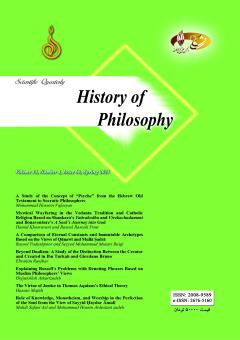The Virtue of Justice in Thomas Aquinas’s Ethical Theory
Subject Areas : Geneology of philosophical schools and Ideas
1 - Associate Professor, Political Science Department, Imam Sadiq University, Tehran, Iran
Keywords: Thomas Aquinas, justice, Ethics, virtue, Christianity,
Abstract :
Thomas Aquinas’s ethical theory reveals his theological and philosophical standing. Influenced by Aristotle, Thomas divides moral virtues into courage, justice, temperance, and prudence. The four mental faculties related to our moral actions are: intellect, will, desire and longing, and hatred and aversion. Accordingly, there must also be four virtues to keep these faculties on the right path: wisdom or prudence for thought and intellect, justice for the will, moderation for desire and longing, and patience for hatred and aversion and what is painful. Other moral virtues derive from these four virtues. Justice results in the observance of individual rights; religion, which is the fulfillment of duty and service to God; respect for elders and obedience to their commands; gratitude for past favors; sincerity, and friendship. One of the most important virtues for Thomas that plays a central role in all his theories is justice, which has various dimensions and angles. He refers to justice as “right,” meaning “equality,” as a natural state and as a value. Thomas pays attention to justice both in terms of “is” and observation and in terms of “ought” and recommendation. The characteristic of justice from his perspective – compared to other virtues – is that justice is considered in the relationship between an individual and others and among individuals, or it is discussed in the relationship of virtues to each other. This paper aims to substantiate the claim that justice in Aquinas's thought, similar to other aspects of his ethical theory, is influenced by Aristotle; however, he does not consider it sufficient for achieving happiness. Moreover, in comparison to the virtue of reason and, more importantly, faith, justice in the Aristotelian reading is necessary, but insufficient and infused and inspired virtues are necessary for attaining true happiness.
بارنز، اچ. ای.؛ بكر، اچ. (1358) تاريخ انديشه اجتماعی، ترجمۀ فريبرز مجيدي، تهران: کتابهاي جيبي فرانکلین.
پنگل، توماس؛ آهرنزدرف، پيتر (1384) عدالت در ميان ملل، ترجمة مصطفي يونسي، تهران: دفتر مطالعات سياسي و بينالمللي وزارت امورخارجه.
صادقي، مرضيه (1381) «جايگاه عدالت در نظام آكوييناس»، نامه مفيد، شمارة 30، ص56ـ49.
مکاينتاير، السیدر (1377) «اخلاق فضيلت¬مدار»، ترجمة حميد شهرياري، نقد و نظر، سال چهارم، شمارة اول و دوم، ص300ـ286.
Aquinas, Thomas (1905). Summa Contra Gentiles (God and his creature). trans. by Joseph Rickby, London: Burns and Oates.
Aquinas, Thomas (1972). Commentary on Ethics. trans. by Charles L. Litzinger. in Medieval Political Philosophy. ed. by Ralph Lerner. New York: Cornel University Press.
Aquinas, Thomas (1981). Aquinas selected political writings. ed. by A. P. D. Enterves, Oxford: Basil Blackwell.
Aquinas, Thomas (1982). On Kingship. trans. by Gerald Phelan. Canada: Pontifical Institute of Medieval Studies.
Aquinas, Thomas (2000). Summa Theologia. trans. by Fathers of English dominion Province Kevin Knight; www.newadvent.org.
Hardon, John (1995). Meaning of virtue in S.T. Aquinas. Catholic book Newsletter. vol. II, no.1; www.ewtn.com.
Macintyre (1988). Whose Justice, Which Rationality? Notre Dame: University of Notre Dame Press.
Schall, James V. (1997). The uniqueness of political philosophy of Thomas Aquinas. Perspectives in Political Science. no. 26.
Sigmund, Paul E. (1993). Law and Politics. in Cambridge Companion to Aquinas. ed. by Norman Kretzmann. New York: Cambridge University Press.
Stump, Eleonore (2003). Aquinas. London: Routledge.
Weithman, Paul J. (1992). Augustine and Aquinas of Original sin and the function of political authority. Journal of the History of Philosophy, vol. 30, no. 3, pp. 353-376.


